The AMD 3rd Gen Ryzen Deep Dive Review: 3700X and 3900X Raising The Bar
by Andrei Frumusanu & Gavin Bonshor on July 7, 2019 9:00 AM EST** = Old results marked were performed with the original BIOS & boost behaviour as published on 7/7.
Benchmarking Performance: Web Tests
While more the focus of low-end and small form factor systems, web-based benchmarks are notoriously difficult to standardize. Modern web browsers are frequently updated, with no recourse to disable those updates, and as such there is difficulty in keeping a common platform. The fast paced nature of browser development means that version numbers (and performance) can change from week to week. Despite this, web tests are often a good measure of user experience: a lot of what most office work is today revolves around web applications, particularly email and office apps, but also interfaces and development environments. Our web tests include some of the industry standard tests, as well as a few popular but older tests.
We have also included our legacy benchmarks in this section, representing a stack of older code for popular benchmarks.
All of our benchmark results can also be found in our benchmark engine, Bench.
WebXPRT 3: Modern Real-World Web Tasks, including AI
The company behind the XPRT test suites, Principled Technologies, has recently released the latest web-test, and rather than attach a year to the name have just called it ‘3’. This latest test (as we started the suite) has built upon and developed the ethos of previous tests: user interaction, office compute, graph generation, list sorting, HTML5, image manipulation, and even goes as far as some AI testing.
For our benchmark, we run the standard test which goes through the benchmark list seven times and provides a final result. We run this standard test four times, and take an average.
Users can access the WebXPRT test at http://principledtechnologies.com/benchmarkxprt/webxprt/
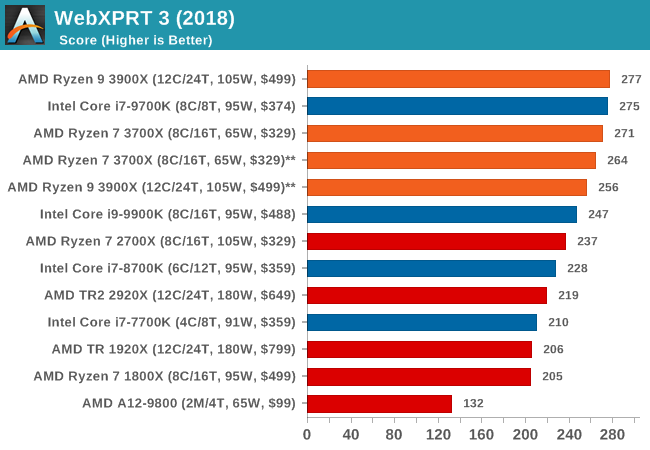
WebXPRT 2015: HTML5 and Javascript Web UX Testing
The older version of WebXPRT is the 2015 edition, which focuses on a slightly different set of web technologies and frameworks that are in use today. This is still a relevant test, especially for users interacting with not-the-latest web applications in the market, of which there are a lot. Web framework development is often very quick but with high turnover, meaning that frameworks are quickly developed, built-upon, used, and then developers move on to the next, and adjusting an application to a new framework is a difficult arduous task, especially with rapid development cycles. This leaves a lot of applications as ‘fixed-in-time’, and relevant to user experience for many years.
Similar to WebXPRT3, the main benchmark is a sectional run repeated seven times, with a final score. We repeat the whole thing four times, and average those final scores.
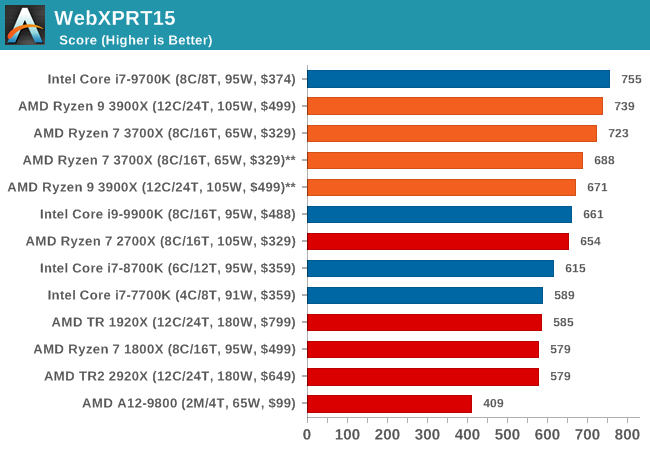
Speedometer 2: JavaScript Frameworks
Our newest web test is Speedometer 2, which is a accrued test over a series of javascript frameworks to do three simple things: built a list, enable each item in the list, and remove the list. All the frameworks implement the same visual cues, but obviously apply them from different coding angles.
Our test goes through the list of frameworks, and produces a final score indicative of ‘rpm’, one of the benchmarks internal metrics. We report this final score.
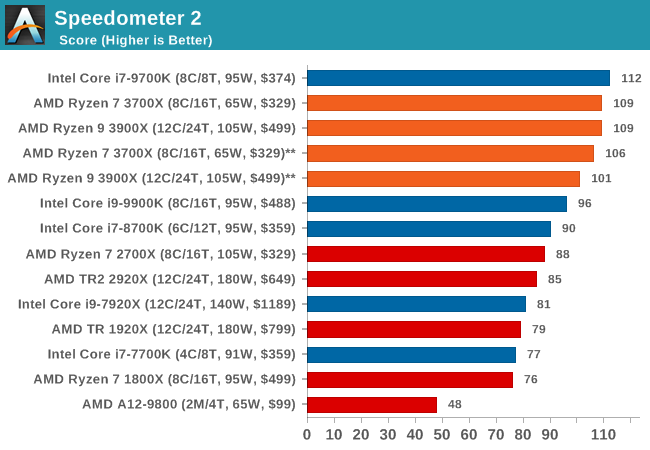
Google Octane 2.0: Core Web Compute
A popular web test for several years, but now no longer being updated, is Octane, developed by Google. Version 2.0 of the test performs the best part of two-dozen compute related tasks, such as regular expressions, cryptography, ray tracing, emulation, and Navier-Stokes physics calculations.
The test gives each sub-test a score and produces a geometric mean of the set as a final result. We run the full benchmark four times, and average the final results.
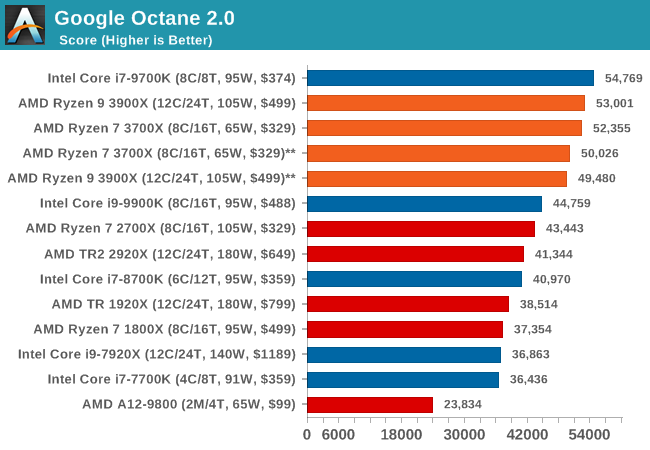
Mozilla Kraken 1.1: Core Web Compute
Even older than Octane is Kraken, this time developed by Mozilla. This is an older test that does similar computational mechanics, such as audio processing or image filtering. Kraken seems to produce a highly variable result depending on the browser version, as it is a test that is keenly optimized for.
The main benchmark runs through each of the sub-tests ten times and produces an average time to completion for each loop, given in milliseconds. We run the full benchmark four times and take an average of the time taken.
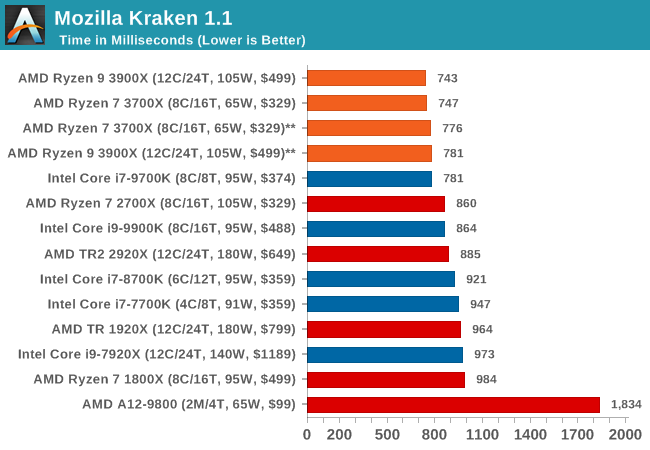
Web Tests Analysis
Overall, in the web tests, the new Ryzen 3900X and 3700X perform very well with both chips showcasing quite large improvements over the 2700X.
We’re seeing quite an interesting match-up against Intel’s 9700K here, which is leading all of the benchmarks. The reason for this is that SKU has SMT turned off. The singe-threaded performance advantage of this is that the CPU core no longer has to share the µOP cache structure between to different threads, and has the whole capacity dedicated to one thread. Web workloads in particular are amongst the most instruction pressure heavy workloads out there, and they benefit extremely from turning SMT off on modern cores.
Whilst we didn’t have the time yet to test the new 3900X and 3700X with SMT off, AMD’s core and op cache works the same in that it’s sharing the capacity amongst two threads, statically partitioning it. I’m pretty sure we’d see larger increases in the web benchmarks when turning off SMT as well, and we’ll be sure to revisit this particular point in the future.










447 Comments
View All Comments
Tkan215 - Monday, July 8, 2019 - link
I dont think so its not easy to refine 10nm like you think how many year it take Intel to refine 10nm it has been already 4 to 5 years dont get your hope up. If volume aint there there is no chance. AMD surelly moving to 7nm euv quicker then 5nmTkan215 - Monday, July 8, 2019 - link
I havent seen them drop any price i9900k went back up at amazon.com. Intel continue to ignore, non response and not caring for their competition. they want their margin this is all this company care about not your feeling or desireTEAMSWITCHER - Sunday, July 7, 2019 - link
It's summer time in Michigan and I have no desire to upgrade right now... I can wait for the flagship 3950X in September.Maxiking - Sunday, July 7, 2019 - link
Local anandtech yield and node experts got hit again. I wonder how many hits you can take before you shut up.As predicted, Intel still faster in games and AMD OC ability more or less unchanged, slighty worse. It is a new node after all buy yeah, you know better, so keep dreaming about those 5ghz on the majority of chips.
Teckk - Sunday, July 7, 2019 - link
So more cores at the same TDP as 2000 series Ryzen is nothing? Ok.Maxiking - Sunday, July 7, 2019 - link
That isn't the thing I was talking about. My point was that local experts, I mean, trolls, know nothing about the manufacturing cost, yields, about the node in general. As it has been showed recently in the reviews, OC ability of the chips is terrible and lower core count parts tend to perform worse, reaching only 4.1 - 4.2 ghz.Teckk - Sunday, July 7, 2019 - link
Ah, got it. It is an improvement, but not good enough.Maxiking - Sunday, July 7, 2019 - link
It is good enough in terms of competition and that we can get things cheaper.But not when the raw performance is tconsidered. It is a hypothetical scenario, but had there been no 10 nm problems for Intel, AMD would have been in the bulldozer position again.
catavalon21 - Sunday, July 7, 2019 - link
I haven't owned an AMD CPU since my K500 a very long time ago, but let's call it what it is - AMD has a CPU at the $500 price point that Intel is charging $1200 presently to compete with, and Intel's solution uses far more power. That's a win for AMD in any domain.imaheadcase - Sunday, July 7, 2019 - link
The problem is that the PC market is stagnant atm, if you are already a intel owner, absolutely no reason to upgrade to amd CPU. Most people who have systems now don't really have any need to upgrade like it used to be.He stated in article it took amd 15 YEARS to get this good CPU finally out and sounded like he was impressed by that?
Its a impressive CPU, but lets be real here, Intel has dominated the market already for years because it has better marketing, better suppliers.
Based on previous article comments, most people are still rocking 2600K CPU..FROM 2011! They still are very good CPU.
Thats not counting the price difference, while yes the one intel cpu is crazy expensive, its not a normal CPU most people have to go by, if you a regular user with the previous mentioned 2600K CPU..that requires a total system overhaul if you wanted to go AMD route...which to be honest is a risk on betting that a new amd system is not going to last as long as a 2600K did for you.